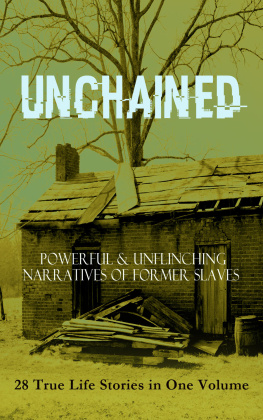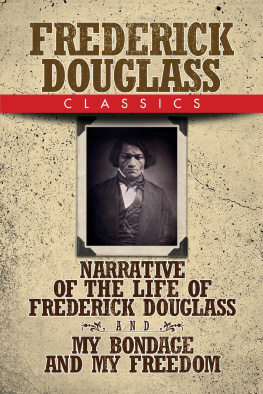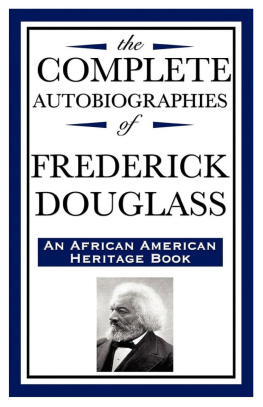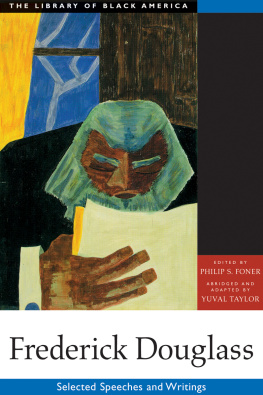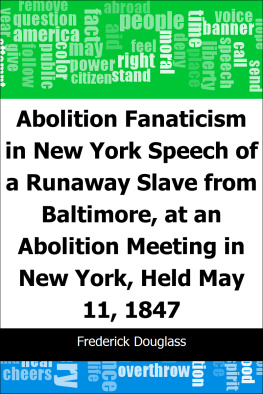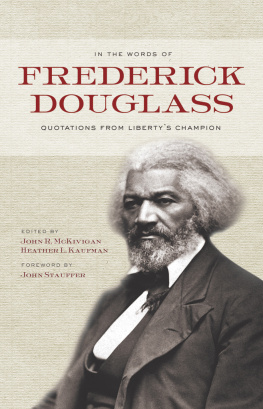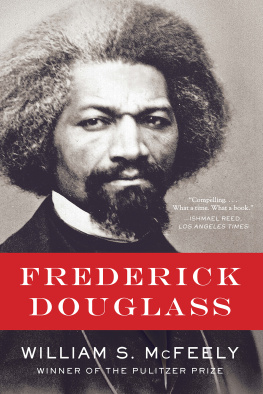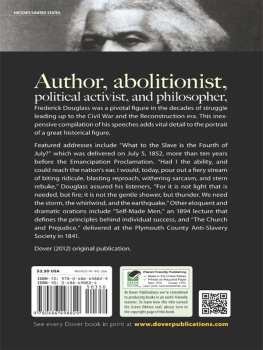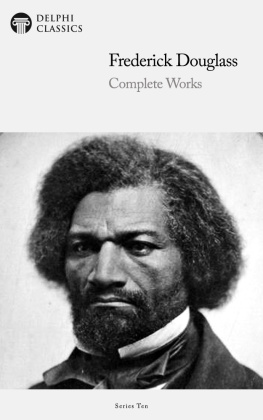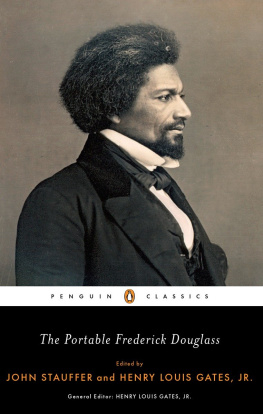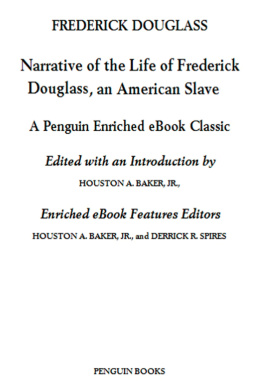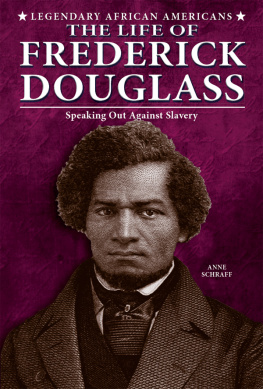Frederick Douglass.
Frederick Douglass was born in slavery as Frederick Augustus Washington Bailey near Easton in Talbot County, Maryland. He was not sure of the exact year of his birth, but he knew that it was 1817 or 1818. As a young boy he was sent to Baltimore, to be a house servant, where he learned to read and write, with the assistance of his master's wife. In 1838 he escaped from slavery and went to New York City, where he married Anna Murray, a free colored woman whom he had met in Baltimore. Soon thereafter he changed his name to Frederick Douglass. In 1841 he addressed a convention of the Massachusetts AntiSlavery Society in Nantucket and so greatly impressed the group that they immediately employed him as an agent. He was such an impressive orator that numerous persons doubted if he had ever been a slave, so he wrote NARRATIVE OF THE LIFE OF FREDERICK DOUGLASS. During the Civil War he assisted in the recruiting of colored men for the 54th and 55th Massachusetts Regiments and consistently argued for the emancipation of slaves. After the war he was active in securing and protecting the rights of the freemen. In his later years, at different times, he was secretary of the Santo Domingo Commission, marshall and recorder of deeds of the District of Columbia, and United States Minister to Haiti. His other autobiographical works are MY BONDAGE AND MY FREEDOM and LIFE AND TIMES OF FREDERICK DOUGLASS, published in 1855 and 1881 respectively. He died in 1895.
CHAPTER I
I was born in Tuckahoe, near Hillsborough, and about twelve miles from Easton, in Talbot county, Maryland. I have no accurate knowledge of my age, never having seen any authentic record containing it. By far the larger part of the slaves know as little of their ages as horses know of theirs, and it is the wish of most masters within my knowledge to keep their slaves thus ignorant. I do not remember to have ever met a slave who could tell of his birthday. They seldom come nearer to it than plantingtime, harvesttime, cherrytime, springtime, or falltime. A want of information concerning my own was a source of unhappiness to me even during childhood. The white children could tell their ages. I could not tell why I ought to be deprived of the same privilege. I was not allowed to make any inquiries of my master concerning it. He deemed all such inquiries on the part of a slave improper and impertinent, and evidence of a restless spirit. The nearest estimate I can give makes me now between twentyseven and twentyeight years of age. I come to this, from hearing my master say, some time during 1835, I was about seventeen years old.
My mother was named Harriet Bailey. She was the daughter of Isaac and Betsey Bailey, both colored, and quite dark. My mother was of a darker complexion than either my grandmother or grandfather.
My father was a white man. He was admitted to be such by all I ever heard speak of my parentage. The opinion was also whispered that my master was my father; but of the correctness of this opinion, I know nothing; the means of knowing was withheld from me. My mother and I were separated when I was but an infantbefore I knew her as my mother. It is a common custom, in the part of Maryland from which I ran away, to part children from their mothers at a very early age. Frequently, before the child has reached its twelfth month, its mother is taken from it, and hired out on some farm a considerable distance off, and the child is placed under the care of an old woman, too old for field labor. For what this separation is done, I do not know, unless it be to hinder the development of the child's affection toward its mother, and to blunt and destroy the natural affection of the mother for the child. This is the inevitable result.
I never saw my mother, to know her as such, more than four or five times in my life; and each of these times was very short in duration, and at night. She was hired by a Mr. Stewart, who lived about twelve miles from my home. She made her journeys to see me in the night, travelling the whole distance on foot, after the performance of her day's work. She was a field hand, and a whipping is the penalty of not being in the field at sunrise, unless a slave has special permission from his or her master to the contrarya permission which they seldom get, and one that gives to him that gives it the proud name of being a kind master. I do not recollect of ever seeing my mother by the light of day. She was with me in the night. She would lie down with me, and get me to sleep, but long before I waked she was gone. Very little communication ever took place between us. Death soon ended what little we could have while she lived, and with it her hardships and suffering. She died when I was about seven years old, on one of my master's farms, near Lee's Mill. I was not allowed to be present during her illness, at her death, or burial. She was gone long before I knew any thing about it. Never having enjoyed, to any considerable extent, her soothing presence, her tender and watchful care, I received the tidings of her death with much the same emotions I should have probably felt at the death of a stranger.
Called thus suddenly away, she left me without the slightest intimation of who my father was. The whisper that my master was my father, may or may not be true; and, true or false, it is of but little consequence to my purpose whilst the fact remains, in all its glaring odiousness, that slaveholders have ordained, and by law established, that the children of slave women shall in all cases follow the condition of their mothers; and this is done too obviously to administer to their own lusts, and make a gratification of their wicked desires profitable as well as pleasurable; for by this cunning arrangement, the slaveholder, in cases not a few, sustains to his slaves the double relation of master and father.
I know of such cases; and it is worthy of remark that such slaves invariably suffer greater hardships, and have more to contend with, than others. They are, in the first place, a constant offence to their mistress. She is ever disposed to find fault with them; they can seldom do any thing to please her; she is never better pleased than when she sees them under the lash, especially when she suspects her husband of showing to his mulatto children favors which he withholds from his black slaves. The master is frequently compelled to sell this class of his slaves, out of deference to the feelings of his white wife; and, cruel as the deed may strike any one to be, for a man to sell his own children to human fleshmongers, it is often the dictate of humanity for him to do so; for, unless he does this, he must not only whip them himself, but must stand by and see one white son tie up his brother, of but few shades darker complexion than himself, and ply the gory lash to his naked back; and if he lisp one word of disapproval, it is set down to his parental partiality, and only makes a bad matter worse, both for himself and the slave whom he would protect and defend.
Every year brings with it multitudes of this class of slaves. It was doubtless in consequence of a knowledge of this fact, that one great statesman of the south predicted the downfall of slavery by the inevitable laws of population. Whether this prophecy is ever fulfilled or not, it is nevertheless plain that a very differentlooking class of people are springing up at the south, and are now held in slavery, from those originally brought to this country from Africa; and if their increase do no other good, it will do away the force of the argument, that God cursed Ham, and therefore American slavery is right. If the lineal descendants of Ham are alone to be scripturally enslaved, it is certain that slavery at the south must soon become unscriptural; for thousands are ushered into the world, annually, who, like myself, owe their existence to white fathers, and those fathers most frequently their own masters.


